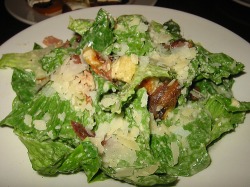Eating right.

The most common mistake is over attention to counting calories. If you are in decent shape (not overweight) and working out, what you eat is much more important than how much you are eating. It is just as bad to under-eat as it is to eat poorly when you are at the gym regularly.
There is no “magical” diet that will get you ripped or help you drop excess fat reliably, and even the best fad diets only work in the short-term. The basic advice you’ve heard before works: get enough fruit and veggies, drink water instead of sugary drinks, eat lean meat, and avoid processed foods. Like your workout, your diet is a regimen that needs to be maintained. If you cut corners throughout the week, you’ll find yourself struggling through workouts and progressing slower, if at all. Stick to a healthy nutrition regimen for six days a week, and indulge a little on Sunday. This can be a cookie or a candy bar, but don’t use the seventh day as an excuse to binge-eat everything or you’ll ruin the hard work you’ve already put in.
If you are maintaining a healthy nutritional regimen and workout regimen, you can get an edge by supplementing. Supplements only work if you are already maximizing your nutritional and workout potential. They fill the gap between what your diet provides and what your workout progress requires; sitting on your butt and popping supplements will do nothing, or worse, screw up your metabolism.
I like to keep it simple: L-Arginine and creatine. L-Arginine is an amino acid used in the natural production of nitric oxide (NO). Among other things, NO promotes blood flow and oxygen transfer through muscle during exercise. By supplementing with L-Arginine, you can increase your natural NO production, which will allow you to work longer and harder without damaging muscle.
There is no “magical” diet that will get you ripped or help you drop excess fat reliably, and even the best fad diets only work in the short-term. The basic advice you’ve heard before works: get enough fruit and veggies, drink water instead of sugary drinks, eat lean meat, and avoid processed foods. Like your workout, your diet is a regimen that needs to be maintained. If you cut corners throughout the week, you’ll find yourself struggling through workouts and progressing slower, if at all. Stick to a healthy nutrition regimen for six days a week, and indulge a little on Sunday. This can be a cookie or a candy bar, but don’t use the seventh day as an excuse to binge-eat everything or you’ll ruin the hard work you’ve already put in.
If you are maintaining a healthy nutritional regimen and workout regimen, you can get an edge by supplementing. Supplements only work if you are already maximizing your nutritional and workout potential. They fill the gap between what your diet provides and what your workout progress requires; sitting on your butt and popping supplements will do nothing, or worse, screw up your metabolism.
I like to keep it simple: L-Arginine and creatine. L-Arginine is an amino acid used in the natural production of nitric oxide (NO). Among other things, NO promotes blood flow and oxygen transfer through muscle during exercise. By supplementing with L-Arginine, you can increase your natural NO production, which will allow you to work longer and harder without damaging muscle.
